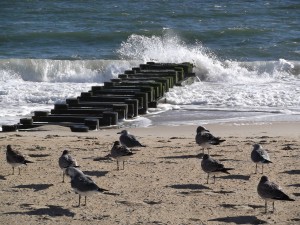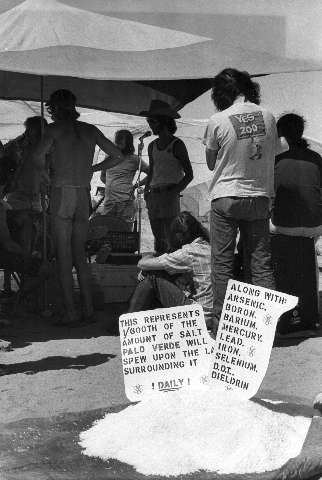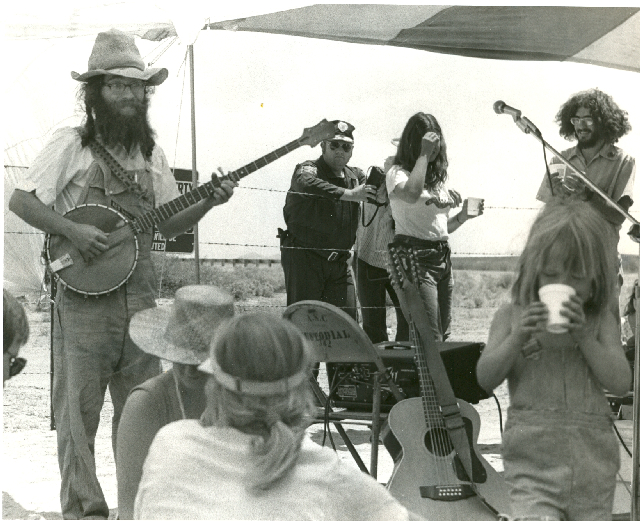On a recent trip to the Delaware shore, I was struck by the jarring notion that in the not so distant future, the sandy beach where I was walking would be reclaimed by the ocean. Although the weather was chilly, I took off my shoes–I needed to feel the cold, wet sand beneath my feet. Each step became a possible goodbye.
Our relationship with water is changing drastically. For years we have read about terrible droughts in Africa, floods in Bangladesh, melting glaciers in the arctic and about how our waterways are becoming polluted. Events where water–too much of it, too little of it, and the compromising of its pristine health occur are becoming more and more common:
- The historic drought in California may well spread throughout the entire Southwest.
- To make matters worse, the Colorado River is drying up at an alarming rate.
- And of course it isn’t just the American West that is in trouble. Nadia Prupis reports that, unless water use is drastically minimized…widespread drought will affect between 30 and 40 percent of the planet by 2020, and another two decades after that will see a severe water shortage that would affect the entire planet.”
- War can severely impact access to safe water as the Iraqis know all too well and as we are seeing now in the Ukraine and in Gaza.
- As can corporate greed, as we are learning in Detroit.
- Acidification is killing fish.
- Throughout the U.S. water service is frequently disrupted by pipe breaks in our aging infrastructure.
- Energy companies pollute our water at will with little real culpability. Think Elk River, think the BP disaster in the Gulf of Mexico and fracking.
- And now we are seeing how allowing the over-fertilization of lawns can contribute to poisoning water supplies such as Lake Erie, recently leaving the entire city of Toledo, OH without potable water.
- We have littered the oceans with literally islands of trash.
- Intersex fish are being found in our waterways, likely the result of endocrine/hormonal disruption due to herbicides, fertilizers and pharmaceuticals that have made their way into our rivers.
- And of course the ongoing disaster that is Fukushima.
That, unfortunately is only the prelude of what is to come. It should be all too clear that we need to immediately change the way we think about this precious resource and take immediate action to protect and conserve water, and practice realistic land use policy in areas where there is drought and along our coasts where impending inundation is a given.
But with the gridlock and sellout of our body politic, that is unlikely to happen. And if it doesn’t, the taps will run dry, our homes will be underwater and there will be inadequate potable water. A grim (and unsurvivable) future indeed.
Many years ago, I had the privilege of attending a water blessing along the banks of the Ohio River conducted by a group called the
International Council of 13 Indigenous Grandmothers,
The truth is our Mother Waters is dying and we are dying with her. However, in this gloomy situation is indeed a message of hope. For our Mother Water shows us that she is dirty because something is wrong with our humanity. She has, and always has, become a mirror to our souls. The simple act of blessing the rivers in fact makes a beautiful re-connection back with all that is life. You do not abuse something you have created a respectful relationship with.
We pray that our Mother Waters in all her forms celestial and physical continues to nurture and guide us. May she continue to run clean so that we and all life can be sustained. We ask for blessings for and from Mother Ganga River, Mother Osun River, Mother Mekong River, the Jordon River, the sacred Catawba River and the many more. We pray that there is healthy clean water for the next seven generations.
We would do well to heed their wisdom.

 I’m so pleased to have my poem,
I’m so pleased to have my poem,  When this story first broke, I saw a picture of water bottles being distributed to those in need, and I was struck by the irony that when you go through airport security, a water bottle is considered a possible weapon of terrorism, but tanks of toxins are allowed to sit upstream of our water supply with little or no regulation:
When this story first broke, I saw a picture of water bottles being distributed to those in need, and I was struck by the irony that when you go through airport security, a water bottle is considered a possible weapon of terrorism, but tanks of toxins are allowed to sit upstream of our water supply with little or no regulation:


 In the pre-hurricane calm before Sandy hits, I am sitting by a window (where I probably don’t want to sit tomorrow), watching the skies darken and thinking of a young man that I’ve known since he was in diapers. After high school, he joined the army and last week, he left to serve in a war zone. All we can do now is pray that he comes back alive, hopefully without his body or mind broken.
In the pre-hurricane calm before Sandy hits, I am sitting by a window (where I probably don’t want to sit tomorrow), watching the skies darken and thinking of a young man that I’ve known since he was in diapers. After high school, he joined the army and last week, he left to serve in a war zone. All we can do now is pray that he comes back alive, hopefully without his body or mind broken.




